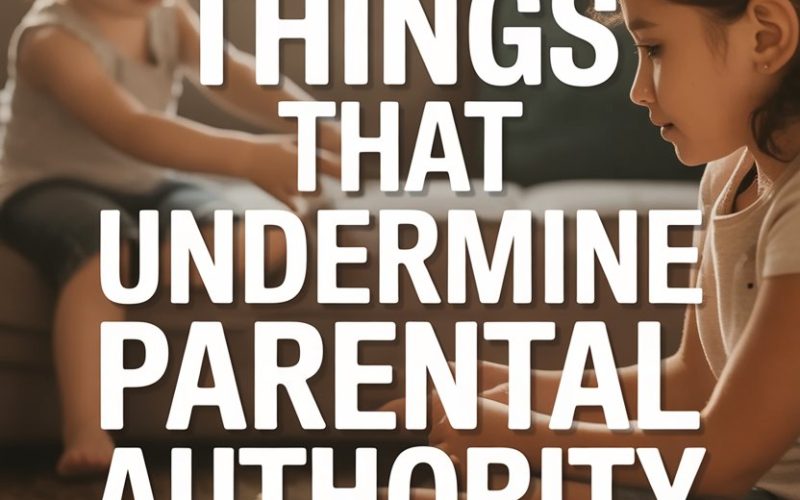Ever felt like your kids have the upper hand and you’re just along for the ride, snacks in hand? You’re not alone.
Parental authority can slip away quicker than your quiet time on a Saturday morning.
If you’ve ever wondered why you sound like a broken record, or why your toddler negotiates bedtime like a tiny, pajama-clad lawyer, read on.
Here are the ten most common ways parents accidentally hand over the reins—and how to take them back, no extra caffeine required.
1. Giving in to Whining
Ah, the siren song of drawn-out “pleeeeease.” The longer they whine, the weaker your resolve feels.
When kids learn that persistence gets results, you’ve basically handed over a megaphone and said, “Use it!”
Researchers highlight that reinforcing whining with a “yes” only guarantees you’ll hear it again. Consistency is your best mate here. Hold steady, even if your eardrums beg for mercy.
A simple, calm, “Asked and answered,” might become your new family motto. (Your kids will love it. Promise.)
2. Inconsistent Rules
One day, jumping on the sofa is hilarious. The next, it’s a cardinal sin.
Kids notice these wobbles faster than a fox spots an unattended chicken coop. They quickly suss out when rules are more like guidelines, and then—surprise!—boundaries vanish.
To keep everyone on the same page (and cushions intact), make rules clear and stick to them. If you decide screens are off at 8pm, don’t budge just because your little one flashes those big, pleading eyes.
3. Arguing Like Peers
Nothing shreds authority quite like descending into a full-on debate with a six-year-old about broccoli. Children are masters at turning a simple request into a televised panel discussion.
Experts from the Child Mind Institute suggest offering brief explanations, then moving on. Deliver your message, stand firm, and resist the urge to keep chatting. Less is more.
4. Threats Without Follow-Through
“Clean your room or no dessert for a week!” And then… dessert magically appears anyway. Empty threats are the junk mail of parenting—they pile up and kids stop reading them.
If a consequence leaves your lips, make sure it actually happens. Choose realistic, age-appropriate consequences, and keep your promises. If things escalate, keep your cool (and maybe hide the chocolate).
5. Over-Explaining Every Decision
Sometimes it feels like you owe your child a detailed report for every “no.” Turns out, explaining every decision at length tends to invite more negotiation rather than understanding.
A simple and direct answer usually works best. “No, you can’t have a biscuit before dinner,” is all that’s needed. If you’re met with protests, repeat your answer calmly.
Eventually, they’ll realise the debate club has closed for the day.
6. Disagreeing in Front of the Kids
You say yes, your partner says no, and now junior is shopping for the best deal. When kids see parents at odds, it turns even minor issues into opportunities for divide-and-conquer tactics.
Back each other up, even if you have to grit your teeth a bit. If you disagree, save it for a private chat. United fronts save a lot of drama—and possibly your last nerve.
7. Apologising for Setting Limits
It’s tempting to soften a “no” with apologies: “I’m sorry, but you can’t have a second ice-cream.” Kids are quick learners; they sense uncertainty faster than you can say “Choc-Chip Ripple.”
Setting boundaries is parenting, not punishment. No need for guilt.
Swap the apologies for confidence: “No more ice-cream today.” Full stop. Everyone survives.
8. Letting Devices Call the Shots
When screens become the household peacekeepers, it’s easy to lose control. That one episode turns into five, and suddenly bedtime is a distant memory.
Experts at Common Sense Media recommend clear, pre-set limits (and yes, even parents should try to stick to them—tough, but fair). Devices make a great servant, but a rubbish boss.
9. Ignoring Your Own Rules
Ever told the kids to put away their phones, then checked yours mid-conversation? Kids notice when rules seem to apply to everyone… except you.
Model the behaviour you want to see. If you value politeness, put your own phone away during dinner. Kids may roll their eyes, but deep down, consistency reassures them.
10. Avoiding Tough Conversations
It’s tempting to sidestep awkward subjects—sex, death, Instagram feuds—hoping they’ll just, you know, sort themselves out.
Silence, though, often signals to kids that these topics are off-limits or unimportant.
Tackle the tricky stuff with honesty, using language your child can understand. Practicing these conversations strengthens your position as a trusted guide, not just a rule-enforcer.
A Little Authority Goes a Long Way
Parenting doesn’t come with a script (if only). Stumbles are inevitable, and most families hand out a few accidental “Get Out of Jail Free” cards along the way.
The good news? Authority is a renewable resource.
Stand firm, laugh at the chaos when you can, and remember: you’re the grownup in the room—even when you feel like you’re just winging it.
And next time you hear, “Mum said I could!”—you’ll be ready.




